
Gary Anthony James Webb, known professionally as Gary Numan, is an English musician. He entered the music industry as frontman of the new wave band Tubeway Army. After releasing two studio albums with the band, he released his debut solo studio album The Pleasure Principle in 1979, topping the UK Albums Chart. His commercial popularity peaked in the late 1970s and early 1980s with hits including "Are 'Friends' Electric?" and "Cars". Numan maintains a cult following. He has sold over 10 million records.

The Old Grey Whistle Test was a British television music show. The show was devised by BBC producer Rowan Ayers, commissioned by David Attenborough and aired on BBC2 from 1971 to 1988. It took over the BBC2 late-night slot from Disco 2, which ran between September 1970 and July 1971, while continuing to feature non-chart music. The original producer, involved in an executive capacity throughout the show's entire history, was Michael Appleton.

Tubeway Army were a London-based new wave band led by lead singer Gary Numan. Formed at the height of punk rock in 1977 the band gradually changed to an electronic sound. They were the first band of the electronic era to have a synthesiser-based number-one hit, with their single "Are 'Friends' Electric?" and its parent album Replicas both topping the UK charts in mid-1979. After its release, Numan opted to drop the Tubeway Army name and release music under his own name as he was the sole songwriter, producer and public face of the band, but he retained the musicians from Tubeway Army as his backing band.
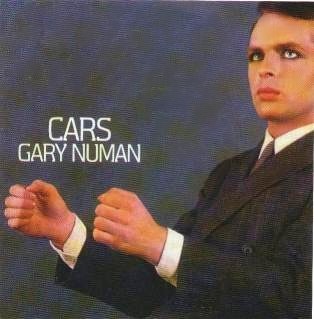
"Cars" is the first solo single by English musician Gary Numan. It was released on 21 August 1979 and is from his debut studio album The Pleasure Principle. The song reached the top of the charts in several countries, and is Numan's most successful single.
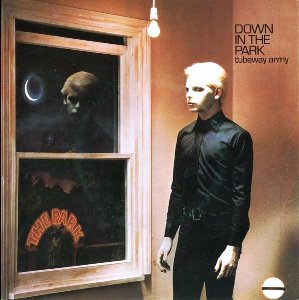
"Down in the Park" is a 1979 song by the English band Tubeway Army, featuring lead vocals by Gary Numan. It was released as the first single from the band's second album Replicas, though was not a hit. The song was written and produced by the band's frontman Gary Numan, and despite its lack of commercial success, has been performed by Numan regularly in his live shows throughout the years.

"Are 'Friends' Electric?" is a 1979 song by the English band Tubeway Army. Taken from their album Replicas, it was released as a single in May 1979 and reached number one in the UK Singles Chart, staying there for four weeks. It was written and produced by Gary Numan, the band's frontman and lead vocalist. It was also the band's last single before breaking up.

Dance is the third solo studio album by the English new wave musician Gary Numan, released on 4 September 1981 by Beggars Banquet Records. It was the first studio album Numan released after his "Farewell Concerts" staged at Wembley Arena.

Replicas is the second and final studio album by the English new wave band Tubeway Army, released on 4 April 1979 by Beggars Banquet Records. It followed their self-titled debut from the previous year. After this, Tubeway Army frontman Gary Numan would continue to release records under his own name, though the musicians in Tubeway Army would continue to work with him for some time. Replicas was the first album of what Numan later termed the "machine" phase of his career, preceding The Pleasure Principle (1979) and Telekon (1980), a collection linked by common themes of a dystopian science fiction future and transmutation of man/machine, coupled with an androgynous image and a synthetic rock sound.
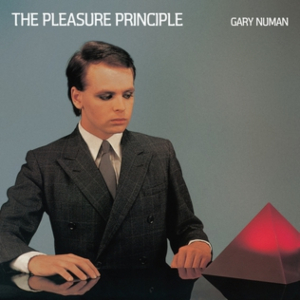
The Pleasure Principle is the debut solo studio album by the English new wave musician Gary Numan, released on 7 September 1979 by Beggars Banquet Records. The album came about six months after Replicas (1979), his second and final studio album with the band Tubeway Army. The Pleasure Principle peaked at No. 1 on the UK Albums Chart.
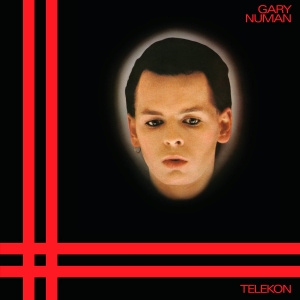
Telekon is the second solo studio album by the English new wave musician Gary Numan. It debuted at the top of the UK Albums Chart in September 1980, making it his third consecutive No. 1 album. It was also the third and final studio release of what Numan retrospectively termed the "machine" section of his career, following Replicas and The Pleasure Principle.
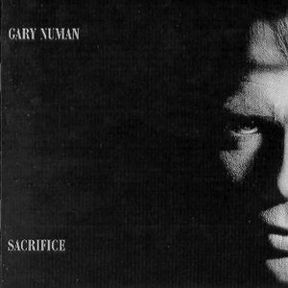
Sacrifice is the twelfth solo studio album by English musician Gary Numan, released in October 1994 by Numa Records. Its release is often cited as marking the start of a critical and artistic rejuvenation for Numan. The album was released in the US in 1997 with a different title, Dawn, based on the comic book character Dawn. It also carried cover art by Joseph Michael Linsner.

Pure is the fourteenth solo studio album by English musician Gary Numan, released in November 2000 by Eagle Records.
"Metal" is a song by Gary Numan from his 1979 album The Pleasure Principle. Lyrically, the song is heavily inspired by science fiction such as the works of Philip K. Dick and William S. Burroughs, and tells the story of an android who wishes to be human but never can be. The song was the B-side of "Cars" in the U.S. The song was released with an accompanying music video. The song recycles lyrics from two outtakes of the songs "The Crazies" and "We Have a Technical" from the recording sessions for Numan's album Replicas, which had been released earlier in 1979.

Jason Charles Lewis known professionally as Jayce Lewis is a Welsh musician from Bridgend, South Wales. In 2009 his self-produced single titled "Icon" achieved a top-10 chart position alongside VH1/MTV Asia Viacom18 features. With strong industrial music and synthpop influences, his music has been described as alternative rock with electronica roots and "tribal percussion". Lewis has collaborated with acts such as Queen Rammstein and synthpop icon Gary Numan, for whom Lewis has been a supporting act three times.

The East End Film Festival was one of the UK's largest film festivals. Founded in 2000 and operating in various venues across East London, the festival focused on emerging British, Eastern European, and Asian films. It ceased operations on March 4, 2020 due to COVID-19.

Splinter (Songs from a Broken Mind) is the seventeenth solo studio album by English musician Gary Numan, released on 9 October 2013 by Mortal Records and Cooking Vinyl. The album debuted at number twenty on the UK Albums Chart on sales of 6,187 copies, becoming Numan's highest-charting album since 1983's Warriors.
"Change Your Mind" is a song recorded by synth-pop duo Sharpe & Numan. Written by Shakatak members Bill Sharpe and Roger Odell and featuring lead vocals by Gary Numan.
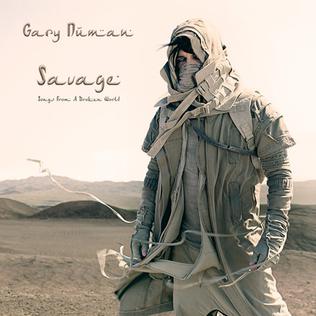
Savage (Songs from a Broken World) is the eighteenth solo studio album by English musician Gary Numan, released on 15 September 2017 by BMG and The End. The album was first announced to be a part of a fan-backed Pledge Music Campaign on 12 November 2015. On 9 November 2018, a followup EP titled The Fallen was released. The EP features similar artwork to Savage, and it was intended to complement the album.

Random is a double-CD tribute album featuring songs by Gary Numan, released in 1997 on his first label, Beggars Banquet.

Intruder is the nineteenth studio album by English musician Gary Numan, released on 21 May 2021 by BMG and The End. It entered UK Albums Chart at number two, on 28 May 2021.
















